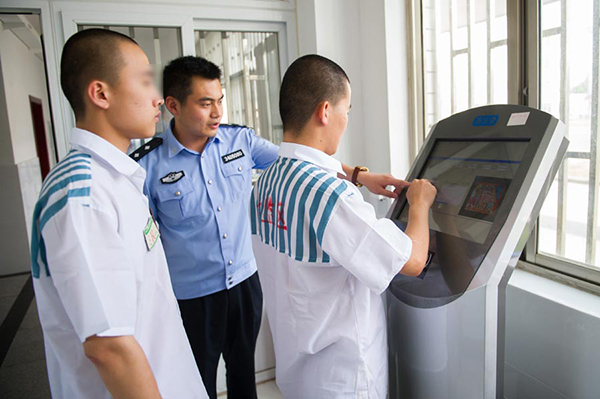Amnesty balanced act of confidence and humanity
Updated: 2015-08-27 07:46
By Gao Mingxuan & Zhao Bingzhi(China Daily)
|
||||||||
 |
|
A prisoner shops online at Anhui Reformatory for Juvenile Delinquents on Monday in Hefei, capital of the province. [Photo/Xinhua] |
The Standing Committee of the National People's Congress, China's top legislature, has decided to set some convicts free as part of the activities to mark the 70th anniversary of the victory of Chinese People's War of Resistance Against Japanese Aggression (1937-45).
The move is in line with China's constitutional amnesty system and will make the occasion more celebratory for some. Granting special amnesty to convicts is a universal practice, which usually is done before major national festivals and commemorative occasions or after significant political changes in a country. Announced before the commemoration of the victory in the fight against fascism, the NPC Standing Committee decision is aimed at reminding people that they should respect history, oppose war, cherish peace and make efforts to prevent a repeat of the tragedy of seven decades ago.
After 30-plus years of reform and opening-up, China has made huge economic and social achievements, which in turn have considerably increased its national strength and improved people's lives. In this sense, the amnesty granted to some convicts shows China is confident of its development path, theory and system thanks to the Party's ruling capability. Also, the amnesty granted to convicts will boost people's morale.
Although only certain types of convicts will be granted amnesty, the NPC Standing Committee decision will make all the people appreciate the country's moral power and thus instill in them a greater sense of patriotism. It will also help people better understand the national spirit of forgiveness and play a role in reducing social disharmony and contradictions, which in turn will help build a harmonious society.
The amnesty decision, which comes 40 years after a similar move in 1975, was made following strict procedures, which include the top legislative body making a decision, the head of state issuing a mandate and the courts preparing a list of prisoners eligible for special amnesty. The top legislature's move sends a message that the government remains committed to "governing according to the Constitution and laws"; it will help enhance people's constitutional and legal awareness, too.
According to the NPC Standing Committee's draft decision, four categories of convicts, including those who took part in the War of Resistance Against Japanese Aggression or the national war of liberation, and those above or below certain ages will get special amnesty. The release of such prisoners before the completion of their sentences is another proof that China adheres to the constitutional spirit, and respects and protects human rights. And it will give the lie to Western accusations against China on human rights.
The proposed amnesty decision shows China deals with convicts in a humane manner and treats different crimes differently - lenient toward some but strict with others. At a time when the country is in transition and society faces threat from criminals, granting amnesty to certain types of convicts will help develop a scientific approach toward crimes and penalties.
Moreover, as a supplement to the penalty system, the practice of amnesty will help improve the response mechanism to crimes by striking the right balance between punishment and leniency. Also, this will motivate other prisoners to change their attitudes and behaviors in order to fully reform themselves so that they too get amnesty.
Gao Mingxuan is the honorary president and Zhao Bingzhi the president of China Criminal Law Society.
- Global health entering new era: WHO chief
- Brazil's planning minister steps aside after recordings revelation
- Vietnam, US adopt joint statement on advancing comprehensive partnership
- European border closures 'inhumane': UN refugee agency
- Japan's foreign minister calls A-bombings extremely regrettable
- Fukushima impact unprecedented for oceans: US expert

 Stars of Lijiang River: Elderly brothers with white beards
Stars of Lijiang River: Elderly brothers with white beards
 Wealthy Chinese children paying money to learn British manners
Wealthy Chinese children paying money to learn British manners
 Military-style wedding: Fighter jets, grooms in dashing uniforms
Military-style wedding: Fighter jets, grooms in dashing uniforms
 Striking photos around the world: May 16 - May 22
Striking photos around the world: May 16 - May 22
 Robots help elderly in nursing home in east China
Robots help elderly in nursing home in east China
 Hanging in the air: Chongqing holds rescue drill
Hanging in the air: Chongqing holds rescue drill
 2.1-ton tofu finishes in two hours in central China
2.1-ton tofu finishes in two hours in central China
 Six things you may not know about Grain Buds
Six things you may not know about Grain Buds
Most Viewed
Editor's Picks

|

|

|

|

|

|
Today's Top News
Liang avoids jail in shooting death
China's finance minister addresses ratings downgrade
Duke alumni visit Chinese Embassy
Marriott unlikely to top Anbang offer for Starwood: Observers
Chinese biopharma debuts on Nasdaq
What ends Jeb Bush's White House hopes
Investigation for Nicolas's campaign
Will US-ASEAN meeting be good for region?
US Weekly

|

|







